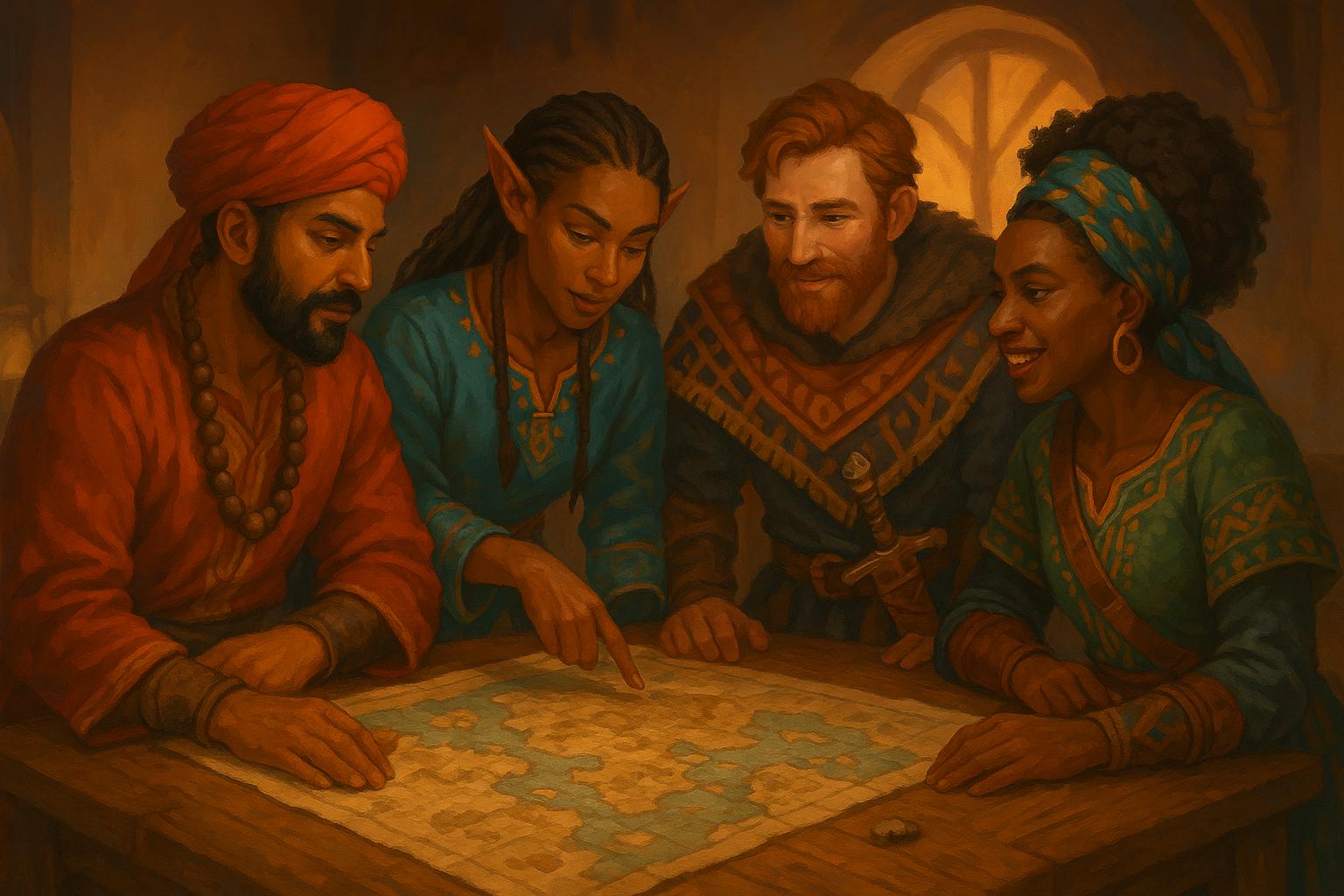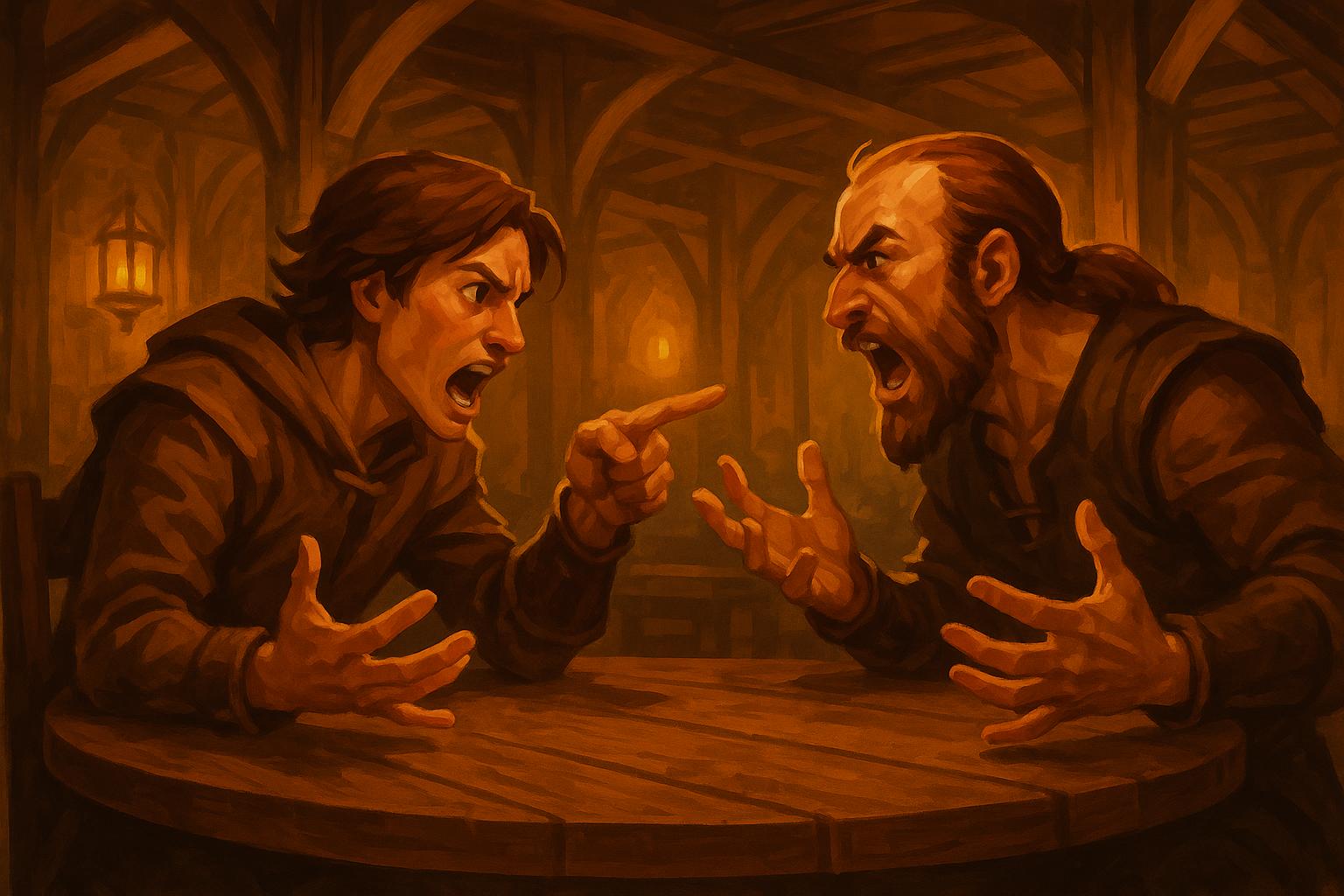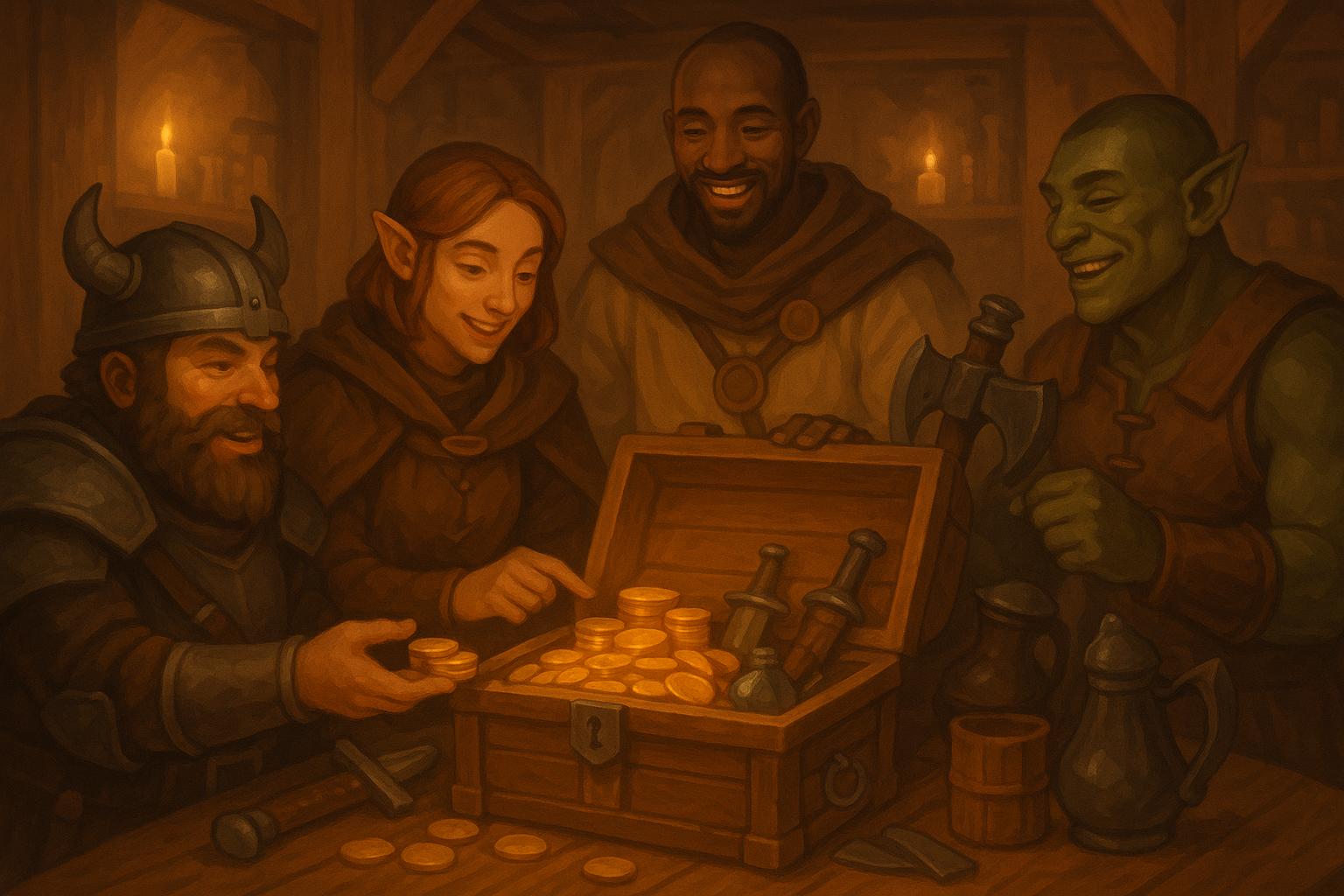NPC interaction systems have evolved from simple dice rolls to robust mechanics that bring depth to storytelling. These systems now track relationships, influence, and social dynamics, giving social encounters the same weight as combat. Below are 7 standout systems that enhance NPC interactions in TTRPGs:
- Legend of the Five Rings (L5R): Tracks Honor, Glory, and Status, with Favor and Obligation for relationship depth. Ideal for political intrigue and court drama.
- The Alexandrian's NPC Response System: Uses a response matrix to track NPC attitudes on a spectrum. Perfect for consistent NPC behavior and evolving relationships.
- PbtA String/Debt Systems: Turns relationships into resources like Strings (Monsterhearts) or Debts (Urban Shadows). Best for personal drama and urban settings.
- DramaSystem: Focuses on emotional exchanges with petitions and tokens. Great for character-driven stories and political intrigue.
- ENWorld Relationship Tracking: Uses a -5 to +5 scale with descriptive tags for connections. Excellent for campaigns with recurring NPCs and faction dynamics.
- FitD Faction Mechanics: Tracks faction status (-3 to +3) and goals with clocks. Ideal for political or urban intrigue.
- Fate Core Social Combat Rules: Treats social encounters like combat with stress, consequences, and NPC Aspects. Works well for high-stakes diplomacy and debates.
Quick Comparison
| System | Core Mechanic | Best For | Complexity |
|---|---|---|---|
| Legend of the Five Rings | Honor, Glory, Status, Favor tracking | Political intrigue, court drama | High |
| The Alexandrian | NPC response matrix | Consistent NPC behavior | Medium |
| PbtA String/Debt | Relationship resources (Strings, Debts) | Personal drama, urban settings | Low |
| DramaSystem | Emotional petitions, tokens | Character-driven stories | Medium |
| ENWorld | Relationship score (-5 to +5) | Recurring NPCs, factions | Customizable |
| FitD Faction | Faction status (-3 to +3), clocks | Political, urban intrigue | High |
| Fate Core | Social combat, NPC Aspects | Diplomacy, debates | Medium |
Each system offers unique tools to enhance your campaign's storytelling and player engagement. Whether you want structured NPC behavior, resource-based relationships, or dynamic faction politics, there's a system here for you.
1. Legend of the Five Rings: Social Mechanics
Core Mechanic
In Legend of the Five Rings (L5R), social interactions are elevated through the use of three key "currencies" - Honor, Glory, and Status. These mechanics bring a tactical layer to conversations, making them as intricate as combat. The system revolves around its Court mechanics, which structure social encounters into three phases: Opening, Discourse, and Resolution. Each phase offers specific mechanical choices, allowing players to influence NPC relationships and drive the story in meaningful ways. This structured design naturally supports the game's focus on deep and evolving relationships.
Relationship Depth
L5R tracks connections with NPCs using Favor and Obligation points, which quantify the social bonds players form. These points aren't just abstract markers; they have tangible effects on gameplay. For instance, gaining high Favor with a court official might provide extra dice when seeking their help. Conversely, accumulating too much Obligation can lead to penalties until the debt is resolved.
The Duel of Words system adds another layer of strategy, focusing on one-on-one confrontations. Here, success hinges on timing and careful planning, creating a sense of tension and pacing that mirrors the stakes of physical combat.
Impact on Gameplay
A character's social standing directly influences outcomes in L5R, with different approaches shaping interactions. Here's a breakdown of how these approaches function:
| Social Approach | Usage | Counters |
|---|---|---|
| Courtly | For formal settings | Traditional NPCs |
| Sincerity | To build trust | Honor-driven NPCs |
| Manipulation | Indirect influence | Politically savvy NPCs |
| Intimidation | Applying direct pressure | NPCs with lower social status |
This dynamic system ensures that every interaction feels purposeful and layered, with players needing to carefully choose their tactics based on the situation and the NPCs involved.
Ideal Use Case
The social mechanics in L5R shine in campaigns that revolve around political intrigue, themes of duty versus personal desire, and long-term stories featuring recurring NPCs. The system creates rich opportunities for players to weigh their actions and words, knowing that a single misstep could have lasting consequences for their character's reputation and relationships within the game world.
Next, we'll explore other systems that offer different takes on NPC interactions.
2. The Alexandrian's NPC Response System
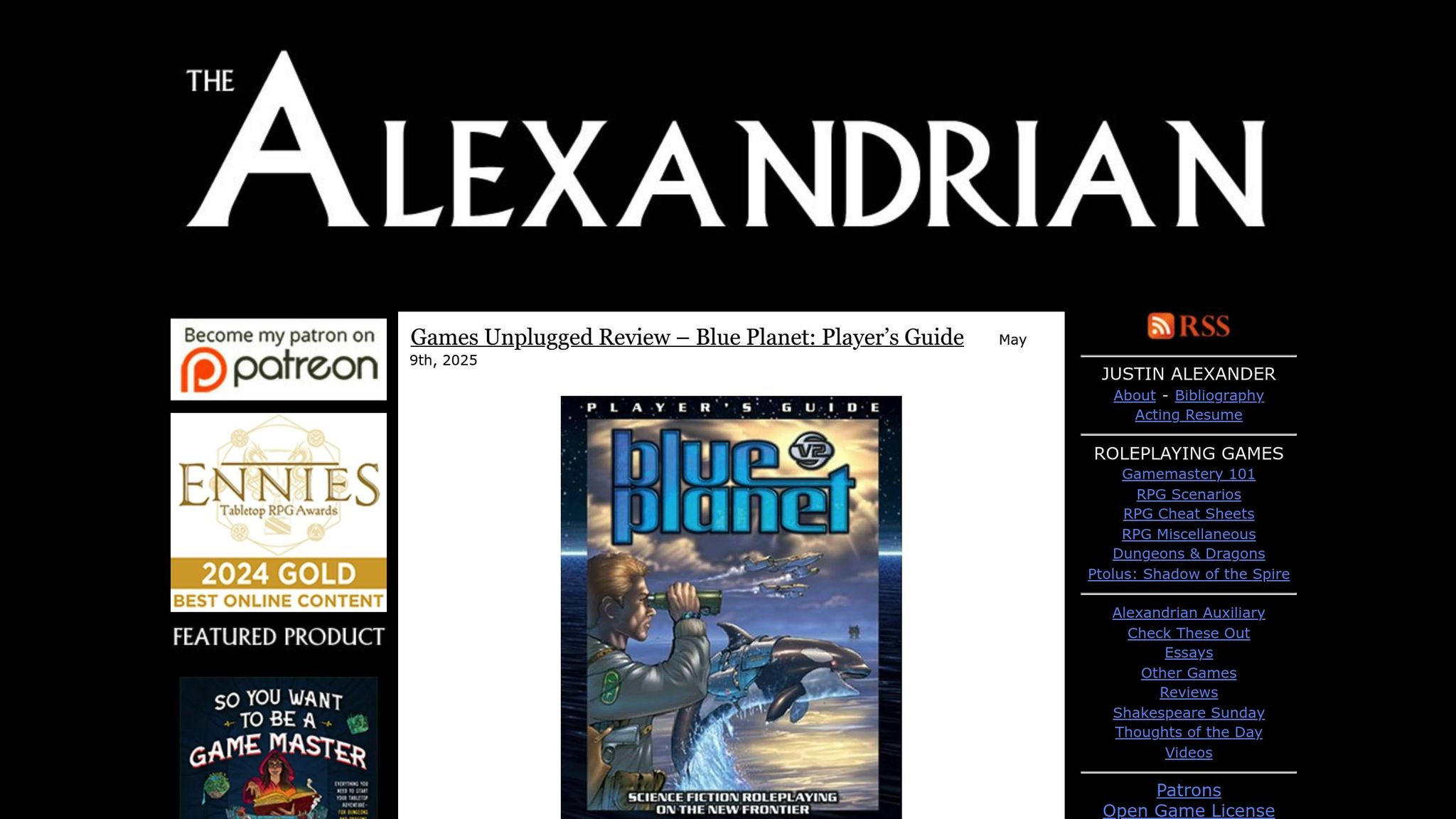
Core Mechanic
The Alexandrian's NPC Response System provides a structured way for Game Masters (GMs) to handle how Non-Player Characters (NPCs) react to players. At its heart is a response matrix, which helps GMs decide NPC behavior based on a spectrum of attitudes. This system takes into account player actions, history, and the current context to deliver consistent and meaningful interactions.
Relationship Depth
Instead of relying on simple pass/fail social checks, this system allows for more layered relationship tracking. NPC attitudes are placed on a spectrum, offering a clearer understanding of their behavior. Here’s a quick breakdown:
| Disposition Level | Key Characteristics | Typical Behaviors |
|---|---|---|
| Hostile | Actively opposes players | Refuses help, may work against players |
| Indifferent | Neutral stance | Shows basic politeness, no special favors |
| Friendly | Positive toward players | Offers help and shares important information |
Impact on Gameplay
This system ties player decisions directly to in-game consequences. For example, successfully negotiating with a city guard could not only solve an immediate problem but also create a useful ally for future encounters. GMs can track these evolving relationships using modifiers that factor in:
- The history of player interactions with the NPC
- The current situation or context
- The character’s reputation within the game world
- Social and cultural dynamics relevant to the setting
By using this method, campaigns can emphasize the importance of social interactions and long-term relationships.
Ideal Use Case
The NPC Response System shines in campaigns where social dynamics take center stage. It’s particularly useful for:
- Urban settings with intricate faction rivalries
- Long-running campaigns where relationships grow and shift over time
- Games that focus on diplomacy and negotiation rather than combat
- Scenarios where reputation and social influence play a critical role
3. String and Debt Systems in PbtA Games
Core Mechanic
Powered by the Apocalypse (PbtA) games take a unique approach to NPC interactions with their String and Debt systems. These mechanics turn social relationships into resources players can actively use during gameplay.
In Monsterhearts, Strings represent emotional leverage. Players can spend Strings to gain mechanical benefits, like adding a +1 bonus when trying to influence an NPC or imposing a -2 penalty on their rolls. This makes social connections a tangible part of the game, where relationships carry real weight.
In contrast, Urban Shadows uses Debts to represent favors and obligations between characters. This creates a "social economy" where players track who owes what, making managing relationships a central gameplay element.
Next, let’s explore how these mechanics deepen character relationships over time.
Relationship Depth
The String and Debt systems go beyond simple skill checks to create relationships that grow and shift over time. These mechanics track the ongoing power dynamics between characters, adding layers to interactions.
| Relationship Currency | Game | Primary Function | Impact on Play |
|---|---|---|---|
| Strings | Monsterhearts | Emotional leverage | Shapes actions and emotions |
| Debts | Urban Shadows | Social obligations | Fuels political maneuvering |
| Influence | Masks | Identity shaping | Drives character development |
Impact on Gameplay
By introducing a social economy, these systems tie personal connections directly to the game's mechanics. When players collect Strings or Debts, they’re not just tracking favors - they’re actively shaping the narrative.
For example, Masks: A New Generation uses its Influence system to highlight the importance of identity and growth. NPCs can use their influence to alter a character’s stats, reinforcing the game's themes while providing clear mechanical consequences.
Ideal Use Case
These mechanics are particularly effective in:
- Political campaigns, where tracking favors and influence is key
- Long-term games that emphasize relationship development
- Urban settings, with their intricate social networks
- Character-driven narratives, where personal connections take center stage
A perfect example is Urban Shadows, where players can leverage multiple Debts to push an NPC faction leader into action. This creates high-stakes drama rooted in the relationships the characters have built, making the social mechanics feel essential to the story.
4. DramaSystem: Scene Structure Rules
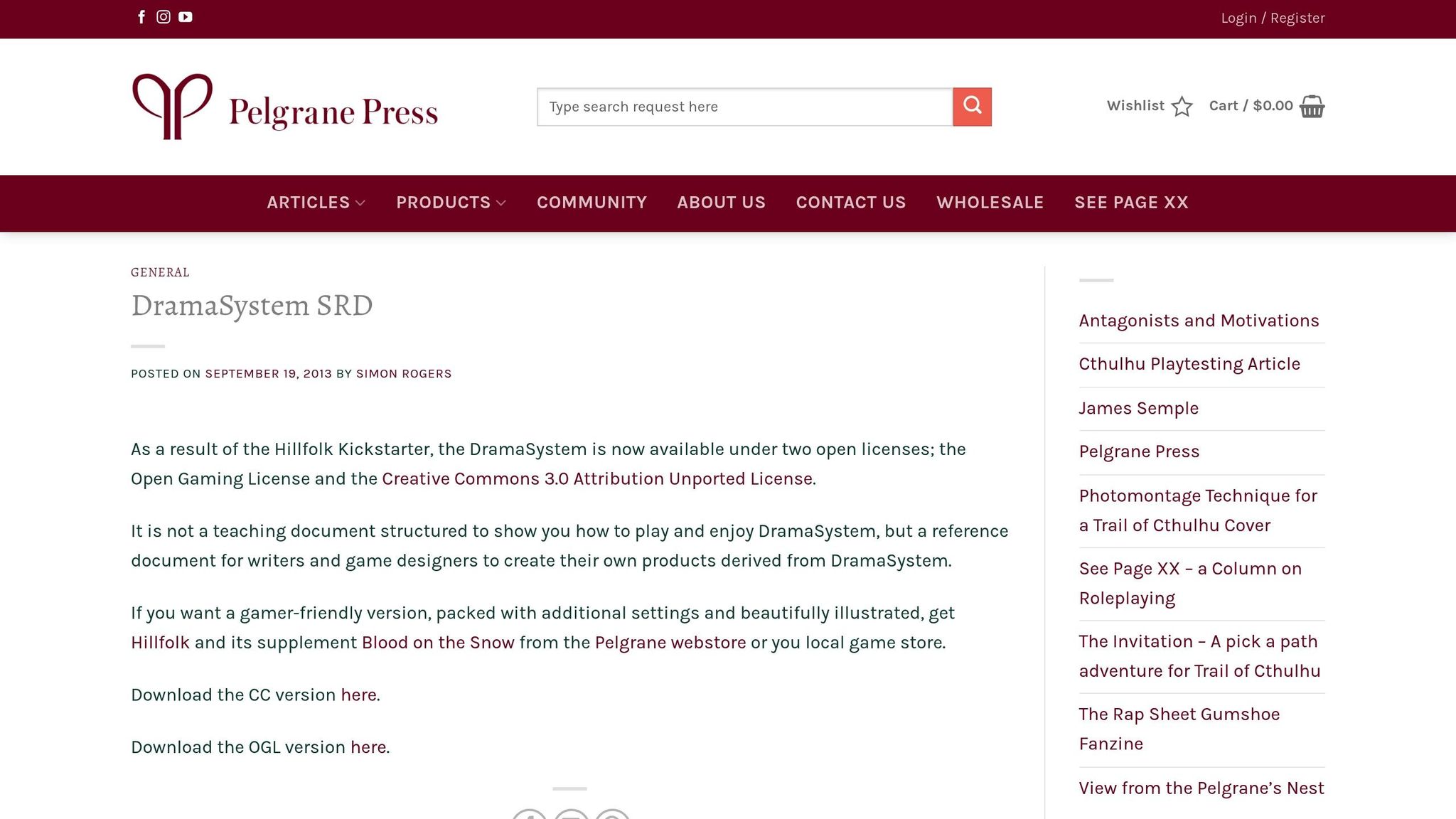
Core Mechanic
DramaSystem shifts the focus of gameplay from dice rolls to emotional interactions by dividing the action into Dramatic and Procedural scenes. In Dramatic Scenes, players make emotional requests, or "petitions", to NPCs. If these petitions are denied, players earn tokens that can later be used for mechanical advantages. This setup allows the game to track the evolving emotional dynamics between characters in a structured way.
Relationship Depth
The mechanics of DramaSystem revolve around petitions and tokens, which serve as tools to explore and deepen character relationships. Here's how the core elements of a scene function:
| Scene Element | Purpose | Impact |
|---|---|---|
| Petition | Emotional request | Drives character motivation |
| Token Exchange | Social currency | Tracks emotional debts |
| Resolution | Character-driven outcome | Preserves NPC authenticity |
These elements work together to create a system where emotional exchanges have tangible effects on gameplay.
Impact on Gameplay
DramaSystem connects character interactions to meaningful gameplay outcomes, much like the systems discussed earlier. Its structure mimics the storytelling rhythm of prestige TV dramas, alternating between emotionally charged confrontations and action-driven moments. This balance keeps players engaged while ensuring that relationships remain at the heart of the narrative.
Ideal Use Case
DramaSystem is particularly effective in campaigns that prioritize social dynamics and character development. Its mechanics are well-suited for scenarios such as:
- Political intrigue: Stories where backroom deals and social maneuvering take center stage.
- Court dramas: Settings with intricate hierarchies and power struggles.
- Family sagas: Games that delve into the complexities of personal relationships.
- Faction politics: Campaigns involving diplomacy and shifting alliances.
The system truly shines in long-term campaigns where relationships have the opportunity to evolve naturally. For example, in a noble court setting, players can forge alliances or rivalries through dramatic scenes, allowing the narrative to grow organically from character interactions rather than relying on pre-planned storylines.
5. ENWorld's NPC Relationship Tracking
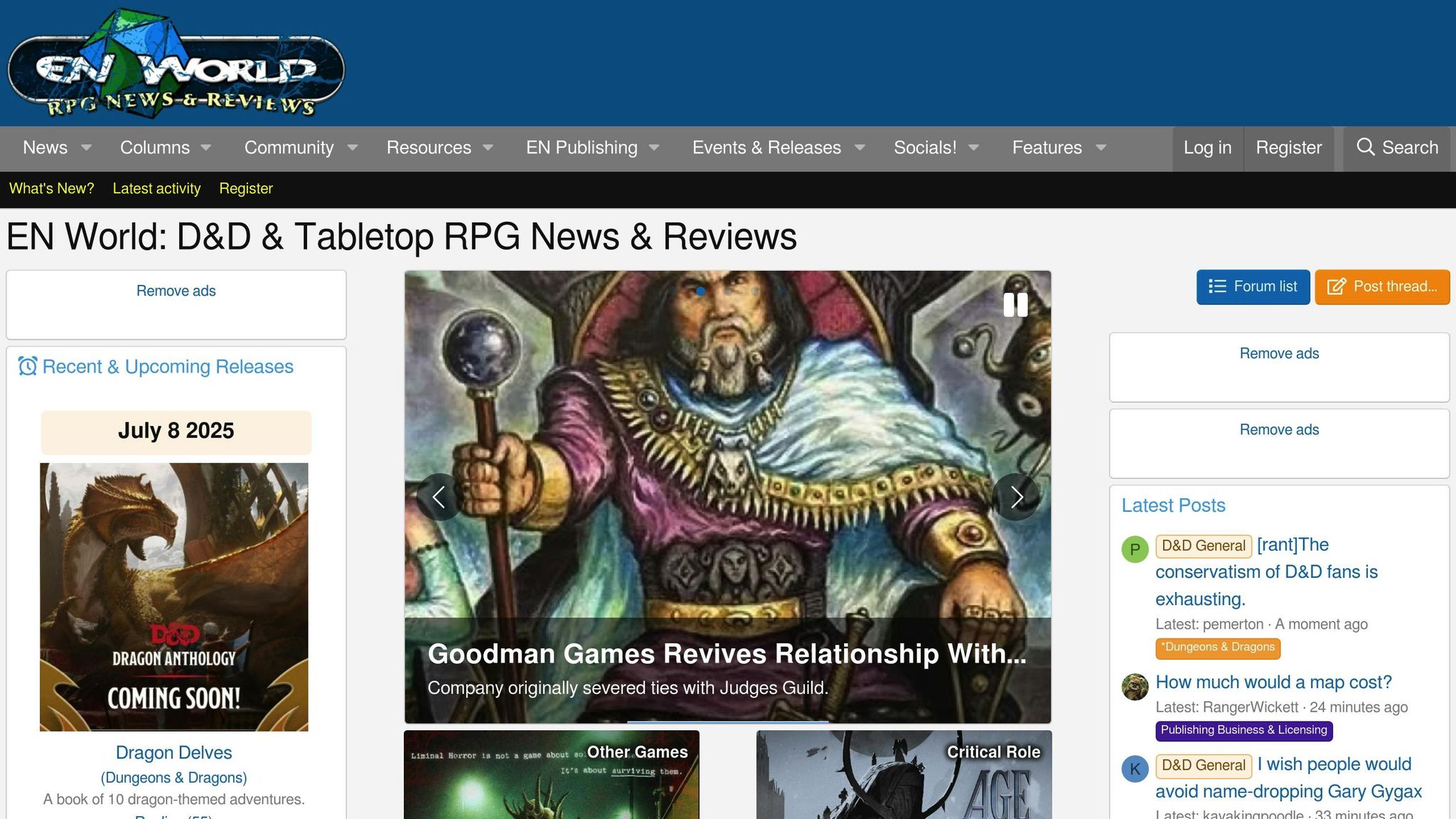
Core Mechanic
ENWorld's system for managing NPC relationships relies on a structured approach. At its heart is a relationship score that ranges from -5 (hostile) to +5 (devoted ally). This score is supplemented with descriptive tags that capture the subtleties of each connection. Together, they provide game masters with a reliable way to keep NPC interactions consistent and meaningful.
Relationship Depth
This system doesn't just stop at a simple score - it dives deeper by tracking multiple aspects of relationships. Here's how it works:
| Relationship Aspect | Tracking Method | Impact |
|---|---|---|
| Trust Level | Numerical (-5 to +5) | Influences how much an NPC is willing to share |
| Loyalty Status | Descriptive Tags | Determines if an NPC will stand by the player in critical moments |
| Social Standing | Event History | Shapes the NPC's reputation within their community |
| Debt/Favor Status | Recorded Interactions | Affects future opportunities, like quests or rewards |
By combining these elements, the system provides a dynamic way to reflect the evolving nature of NPC relationships.
Impact on Gameplay
This tracking system ensures that social interactions have tangible consequences. For example, a successful negotiation might raise a relationship score from 0 to +2, leading to perks like better prices or access to rare items. On the flip side, betraying a noble's trust could drop the score to -3, resulting in penalties such as restricted movement in certain areas or hostility from the noble's allies. The clear, actionable metrics make it easy for game masters to integrate these changes into the narrative.
Ideal Use Case
This system shines in campaigns where social dynamics and evolving relationships take center stage. Here's where it fits best:
| Campaign Type | Application |
|---|---|
| Political Intrigue | Tracking alliances and shifting loyalties |
| Urban Adventures | Managing relationships with key figures like guild leaders or merchants |
| Long-term Campaigns | Keeping tabs on relationships across multiple sessions |
| Faction-based Games | Monitoring standings with various power groups |
To keep things manageable, it's recommended to apply this system to key NPCs only. This way, you can maintain focus on important relationships while still enriching the story's depth.
sbb-itb-b8b00a5
6. Faction Mechanics in FitD Games
Core Mechanic
In Forged in the Dark (FitD) games, the faction system adds depth to NPC interactions by using a simple numerical scale. This scale, ranging from –3 (hostile) to +3 (allied), reflects the relationship between player characters and various factions. It creates a living, breathing web of alliances, rivalries, and shifting politics, all shaped by player decisions. Essentially, it’s a tool that tracks how these relationships evolve over time.
One standout feature of this system is the "faction turn", which happens between game sessions. During this phase, factions independently pursue their goals, form alliances, or react to the players’ actions. This ensures that the world feels alive and dynamic, even when the players aren’t directly interacting with it.
Relationship Depth
Faction relationships in FitD games are represented with clear mechanics that bring depth and structure. Here’s a quick breakdown:
| Aspect | Mechanic | Effect |
|---|---|---|
| Status | –3 to +3 Scale | Shows how a faction feels about the players |
| Projects | Faction Clocks | Tracks a faction’s progress toward its goals |
These mechanics make it easy to visualize and manage how factions interact with the players and the world around them.
Impact on Gameplay
The faction system directly influences how players navigate the game world. Aligning with a faction can improve standing, grant access to resources, or open new opportunities. On the flip side, opposing a faction can lead to resistance, complications, or even outright hostility.
This dynamic naturally shapes the way players approach challenges and alliances, making every decision feel impactful and meaningful.
Ideal Use Case
FitD faction mechanics shine in campaigns where competing power groups and political tension take center stage. They’re especially effective in settings like:
| Campaign Setting | How It’s Used |
|---|---|
| Urban Intrigue | Managing rival criminal networks or power groups |
| Political Drama | Navigating the schemes of noble houses and institutions |
| Frontier Settings | Balancing emerging powers with established factions |
| Military Campaigns | Tracking alliances and rivalries between units on the battlefield |
This system works best when players act as a rising power, carefully managing their relationships with established factions. To keep things manageable, Game Masters (GMs) should start with 5–7 core factions and gradually introduce more as the campaign progresses. This approach ensures a layered political landscape without overwhelming complexity.
7. Fate Core's Social Combat Rules

Core Mechanic
Fate Core treats social interactions with the same level of mechanical importance as physical combat, giving players a structured way to handle these encounters. Using the system's signature stress and consequences framework, players can engage in social conflicts that leave lasting impressions on NPCs.
Here’s how it works, broken into four key actions:
- Attack: Apply social or mental pressure to sway or intimidate.
- Defend: Resist attempts at manipulation or coercion.
- Create an Advantage: Set up favorable social conditions or exploit weaknesses.
- Overcome: Navigate through social challenges or obstacles.
These mechanics rely on mental stress tracks and consequences, ensuring that actions like persuasion, intimidation, or deception are as tactically rich as a swordfight. This approach ties seamlessly into the system's narrative-driven gameplay.
Relationship Depth
Fate Core's aspect system adds another layer of complexity to NPC interactions. NPCs are defined by traits, called aspects, that players can uncover and use to their advantage during social encounters. Here’s a breakdown of common aspect types:
| Aspect Type | Purpose | Example |
|---|---|---|
| Core Beliefs | Reflect fundamental values | "By-the-Book Officer" |
| Vulnerabilities | Highlight exploitable flaws | "Secret Gambling Debt" |
| Relationships | Show connections to others | "Trusts the Party's Diplomat" |
As players interact with NPCs, they can reveal these aspects and either invoke them for bonuses or compel them to create tension. This strategic element makes understanding NPC motivations a powerful tool during social conflicts.
Impact on Gameplay
Social conflicts in Fate Core aren’t just about winning an argument - they can reshape the story. When NPCs face significant social pressure, they may develop new or altered aspects to reflect their changing relationships with the party. The severity of these consequences determines their duration and impact:
| Severity | Consequence Duration | Example Impact |
|---|---|---|
| Mild | Short-term | "Temporarily Swayed" |
| Moderate | Several sessions | "Questioning Loyalties" |
| Severe | Long-lasting | "Complete Loss of Faith" |
These consequences ensure that social interactions carry weight, influencing not only individual relationships but also the broader direction of the campaign.
Ideal Use Case
Fate Core’s social combat rules shine in campaigns that focus on diplomacy, character relationships, and non-violent solutions. Here’s where they work best:
- Political Intrigue: Perfect for navigating complex negotiations, power struggles, and behind-the-scenes maneuvering. The system’s depth with social consequences and aspect manipulation makes it ideal for these scenarios.
- Character-Driven Stories: When players invest in building relationships with recurring NPCs, every interaction can become a pivotal moment, adding emotional and strategic depth to the game.
- Non-Violent Problem Solving: Campaigns that prioritize diplomacy or clever negotiation over brute force can make full use of the system’s tactical social mechanics.
Building Relationship-Based Systems and Controlling NPC Interactions #unrealengine #ue5
System Features Comparison
Here's a breakdown of several systems and what they bring to the table:
| System | Core Mechanics | Complexity | Relationship Tracking | Best For |
|---|---|---|---|---|
| Legend of the Five Rings | Status and honor-based social mechanics | High | Tracks status, favor, and reputation scores | Court intrigue and social maneuvering |
| The Alexandrian | Structured NPC response guidelines | Medium | Ensures consistent NPC behavior tracking | Managing consistent NPC interactions |
| PbtA String/Debt | Resource-based relationship currency | Low | Uses Strings and Debts as tangible metrics | Personal drama and character relationships |
| DramaSystem | Scene-based emotional exchanges | Medium | Drama Tokens reflect dynamic emotional shifts | Collaborative storytelling and emotional depth |
| ENWorld Tracking | Adaptive NPC relationship scoring | Customizable | Tracks detailed evolution of NPC connections | Campaigns with recurring NPCs |
| FitD Faction | Group-based relationship mechanics | High | Uses status levels and faction clocks | Political intrigue and power struggles |
| Fate Core | Social combat framework | Medium | Tracks Aspects and social consequences | High-stakes negotiations and debates |
This table highlights the strengths of each system, making it easier to pick one that aligns with your campaign's goals.
Implementation Considerations
When choosing a system, think about these factors:
- Ease of Use vs. Depth: PbtA's String system is simple and quick to implement, making it perfect for games that prioritize speed. On the other hand, Legend of the Five Rings offers a more intricate approach, ideal for campaigns centered on layered social dynamics.
- Narrative Flexibility: DramaSystem and Fate Core empower players to shape the story, giving them significant control over outcomes. Conversely, The Alexandrian's structured approach ensures NPC responses remain consistent, which can help maintain narrative coherence.
- Tracking Relationships: Each system has its own way of managing relationships. Some use tangible resources like Strings or Debts, while others rely on status tracking or social consequences to reflect evolving dynamics.
Adaptation Potential
These systems aren't limited to their original designs - they can be adapted to suit different game styles:
- PbtA's String mechanics could work well in fantasy RPGs, adding emotional depth to character relationships.
- ENWorld's relationship tracking is versatile enough to enhance any campaign, especially those with recurring NPCs.
- Fate Core's social combat can bring a structured approach to resolving debates or negotiations in various genres.
Conclusion
The way NPC interaction systems are designed in TTRPGs has come a long way, offering tools that bring depth and meaning to in-game relationships. These modern systems focus more on a character's abilities than a player's performance, reshaping how social encounters unfold in tabletop games.
Today’s designs blend mechanics with storytelling, giving social interactions the same level of attention that combat has traditionally received. This shift not only enhances gameplay but also provides Game Masters (GMs) with practical tools for crafting engaging campaigns. Whether you're running a political intrigue-heavy game that could use Legend of the Five Rings' status mechanics or looking to bring recurring NPCs to life with ENWorld's relationship tracking, there’s a system out there to match your campaign's needs.
As TTRPGs continue to evolve, we can anticipate even more advanced systems that balance mechanical depth with narrative flexibility. The growing role of digital tools in tabletop gaming will likely streamline the way we handle complex social and relationship dynamics, making them easier to integrate into gameplay.
For GMs ready to explore these systems, the TTRPG Games Directory is a great resource. It offers detailed listings that highlight the strengths of various systems, helping you find one that fits your preferred style of storytelling and character development.
Whether you opt for the simplicity of PbtA's Strings or the intricate social mechanics of Fate Core, the goal is the same: to create rich, memorable interactions that elevate your storytelling and make your campaigns truly unforgettable.
FAQs
How can I pick the right NPC interaction system for my TTRPG campaign?
Choosing the right NPC interaction system hinges on the genre and playstyle you want to bring to life in your campaign. Are you aiming for rich relationship-building, immersive storytelling, or a gameplay style that leans heavily on mechanics? Your preferences here will guide the decision.
Think about the tone of your game - whether it's fantasy, sci-fi, or modern-day - and how NPC interactions can elevate the overall experience. Some systems dive deep into emotional connections, while others emphasize strategy or narrative-focused encounters. The key is to pinpoint what will resonate most with your players and align with the goals of your campaign.
Take time to explore the mechanics and features different systems offer. Look for ones that align with your vision for the game and cater to the dynamics of your group. A well-matched system can make all the difference in creating a memorable and engaging experience.
Can NPC interaction systems be used in different TTRPG genres than they were originally designed for?
Absolutely! Many NPC interaction systems are versatile enough to work across a wide range of tabletop RPG genres. While these systems are often built with a specific setting or theme in mind, their fundamental mechanics - like relationship-building, dialogue options, or reputation tracking - can easily be adapted to suit different worlds and narratives.
Take a system designed for a medieval fantasy game, for instance. With a few adjustments to terminology and the context of interactions, it could seamlessly fit into a sci-fi setting. The trick is to make sure the mechanics align with the tone and themes of your chosen genre, enhancing both the storytelling and the overall player experience.
What are the advantages of using a structured NPC interaction system over freeform role-playing?
Structured NPC interaction systems bring a lot to the table for tabletop RPGs, especially when it comes to gameplay and storytelling. They introduce clear rules and mechanics that guide player-NPC interactions, helping players and game masters navigate tricky relationships or negotiations without unnecessary confusion.
These systems also promote consistency and fairness, which is particularly useful in moments involving persuasion, diplomacy, or conflict resolution. Many of these mechanics go a step further by including tools to track relationships or character development. This not only adds depth to the story but also makes NPCs feel more engaging and impactful to the players.
While freeform role-playing thrives on improvisation, structured systems act as a supportive framework. They’re especially useful for groups that prioritize balanced gameplay or need a bit of structure to keep the narrative flowing smoothly.
